40+ Jobs You Can Get With Medical Coding Certificates
We’ve compiled a list of over 40 different jobs for medical coders with certificates. Also, there are six in-depth descriptions of positions that you could have as a medical coder.

Medical coding isn’t a dying career. There are thousands of opportunities for medical coders in the United States.
Trying to find those jobs and understand your options can be challenging.
Have you ever wondered what kind of jobs you could get as a medical coder with a certificate? Is getting a certificate even worth the effort? Well, I have news for you.
Getting a certificate can mean a significant increase in your paycheck. It can often mean a $5,000 increase in your salary and sometimes as much as a $20,000 raise!
But not everyone is money motivated. Some people are more motivated by the environment they work in or the organization they work for. Many specialty positions need certificates. Specialty positions can mean working in a clinic, the emergency room, or even in-home health.
We’ve compiled a list of over 40 different jobs for medical coders with certificates. Also, there are six in-depth descriptions of positions that you could have as a medical coder.
Clinic Coder
- Number of Jobs on ZipRecruiter: 25,900+ in the United States
- Average Pay: $20-$30 an hour, or $45,000-$70,000 a year

A clinic coder needs to assign appropriate medical codes based on the documentation. You’ll need to know information about diagnoses, procedures, and demographics. It just depends on the clinic’s policies.
Since there will most likely be software and databases involved, you’ll need to have a high typing pace and practice with management systems. You need to know coding guidelines and reimbursement reporting requirements.
Some employers won’t specify what kind of certification a prospect will need. However, some specify that the position requires one or more of the following certifications:
- Certified Coding Specialist (CCS)
- Registered Health Information Tech (RHIT)
- Certified Professional Coder (CPC)
- Certified Coding Associate (CCA)
- Certified Outpatient Coder (COC)
Risk Adjustment Coder
- Number of Jobs on Indeed: + 350 in the United States
- Average Pay: $20-$33 an hour or $50,000-$75,000 a year
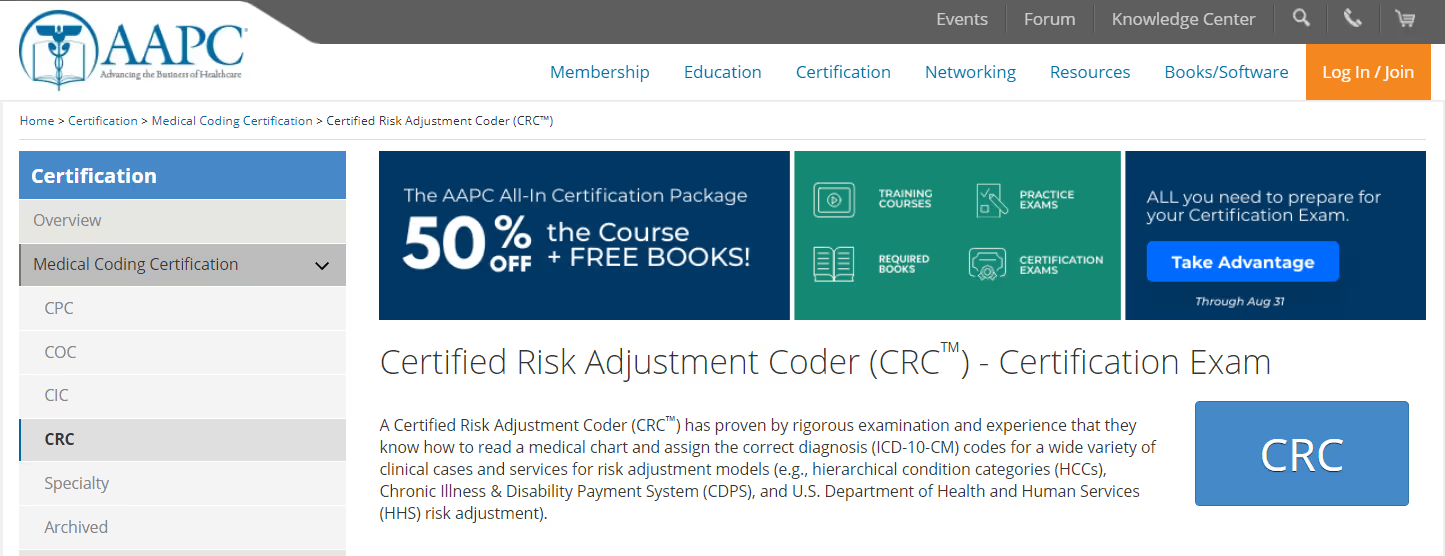
To be a Risk Adjustment Coder, you need to prove you know how to read a medical chart and assign the correct diagnosis. Since you will experience a wide variety of cases in the workplace, you need to know the ICD-10-CM codes. You also need to know regulations about compliance and reimbursement of the assigned code on the payment models.
You also need to understand the audit process for the risk adjustment models. You must communicate how to improve documentation for accurate risk adjustment coding. Not to mention knowing anatomy, pathophysiology, and medical terminology for code diagnoses.
Different organizations will need you to have different certifications for this position.
Out of the 352 organizations listed in Indeed...
- 286 organizations say they need you to have the Professional Coder Certification, or the CPC
- 126 organizations require the AHIMA certification
- 125 organizations mandate the Coding Specialist Certification, or the CSC
Certified Outpatient Coder
- Number of Jobs on Indeed: about 400 in the United States
- Average Pay: $23-$29 an hour; or $60,000-$70,000 a year
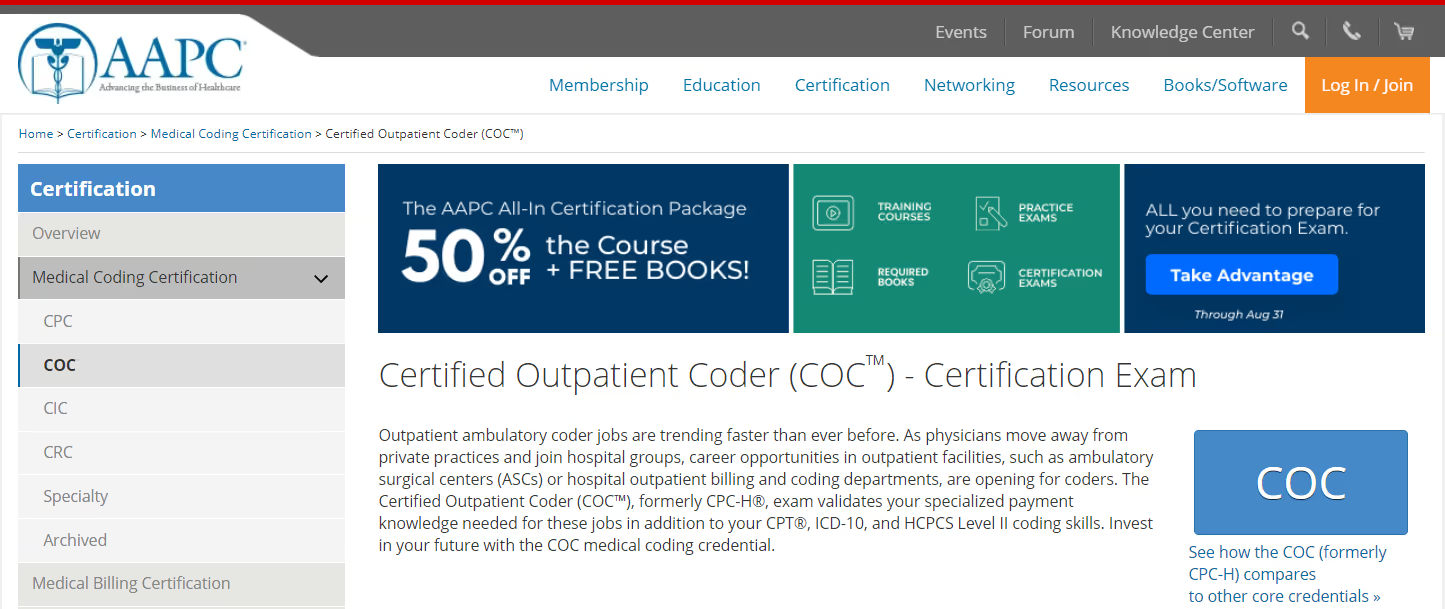
An outpatient coder needs to know several areas. This includes assigning accurate medical codes for diagnoses, procedures, and services performed. This can happen in outpatient clinics, same-day surgeries, physical therapy, chemotherapy, and more.
You must have a detail-oriented mind. After all, you’ll be working in areas like anesthesia, radiology, pathology, and more.
You also need to know medical codes and the regulations involved with coding. Knowledge of anatomy, physiology, and medical terminology is also mandatory.
Many employers will accept several coding certificates, including:
- Certified Outpatient Coder (COC) (preferred)
- Certified Coder Specialist (CCS)
- Certified Coder Specialist – Physician (CCS-P)
- Certified Professional Coder (CPC)
- Certified Inpatient Coder (CIC)
- Registered Health Information Technologist (RHIT)
- Registered Health Information Administrator (RHIA)
Certified Home Health Coder
- Number of Jobs on Indeed: 140+ in the United States
- Average Pay: $45,000-$60,000 annually
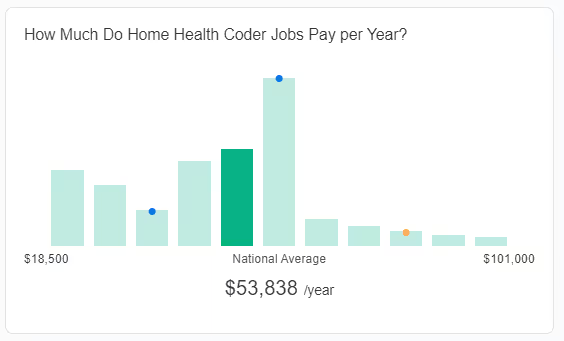
Anyone working as a certified home health coder needs to know the ICD-10-CM system and coding guidelines. You’ll need to know how to evaluate and change documentations related to ICD-10-CM codes.
You also need to know concepts of human anatomy, physiology, and pathology. Knowledge of OASIS is necessary.
Many companies will need you to observe and report unusual patterns in data collection and a lack of adequate documentation for code assignments.
Most employers require these certifications for the home health coder position:
- Certification in Home Health Coding
- National ICD-10 Coding certification
- National OASIS Certification
Anesthesia Medical Coder
- Number of Jobs on ZipRecruiter: 150+ in the United States
- Average Pay: $40,000-$55,000 a year
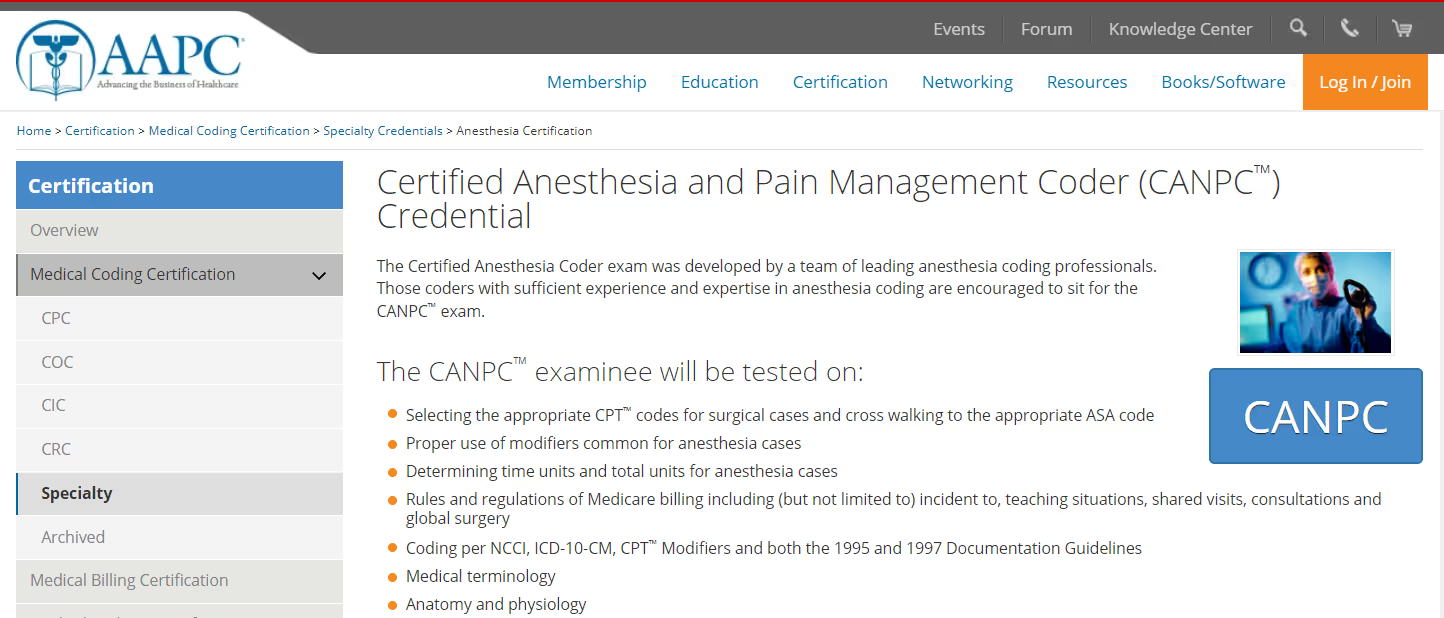
Someone who wants to apply for an anesthesia medical coder job needs to meet some specific requirements. This is a specialty field after all.
You need to know about all of the CPT codes for surgical cases. You also need to understand the proper use of modifiers common for anesthesia. In addition, you need to be able to properly determine time units and total units related to anesthesia cases.
You must know the rules and regulations of Medicare billing including (but not limited to) incidents to, teaching situations, shared visits, consultations, and global surgery. You must also know medical terminology including anatomy and physiology.
An anesthesia medical coder needs to understand the coding per NCCI, ICD-10-CM, CPT Modifiers, and the documentation guidelines.
But what certificates does this position require? Well, that depends on the organization. These are some certifications that different organizations will accept:
- Certified Professional Coder (CPC)
- Certified Coding Specialist-Physician (CCS-P)
- Anesthesia and Pain Management Certification (CANPC)
Emergency Facility Medical Coder
- Number of Jobs on Indeed: 250+ in the United States
- Average Pay: $45,000-$60,000 a year
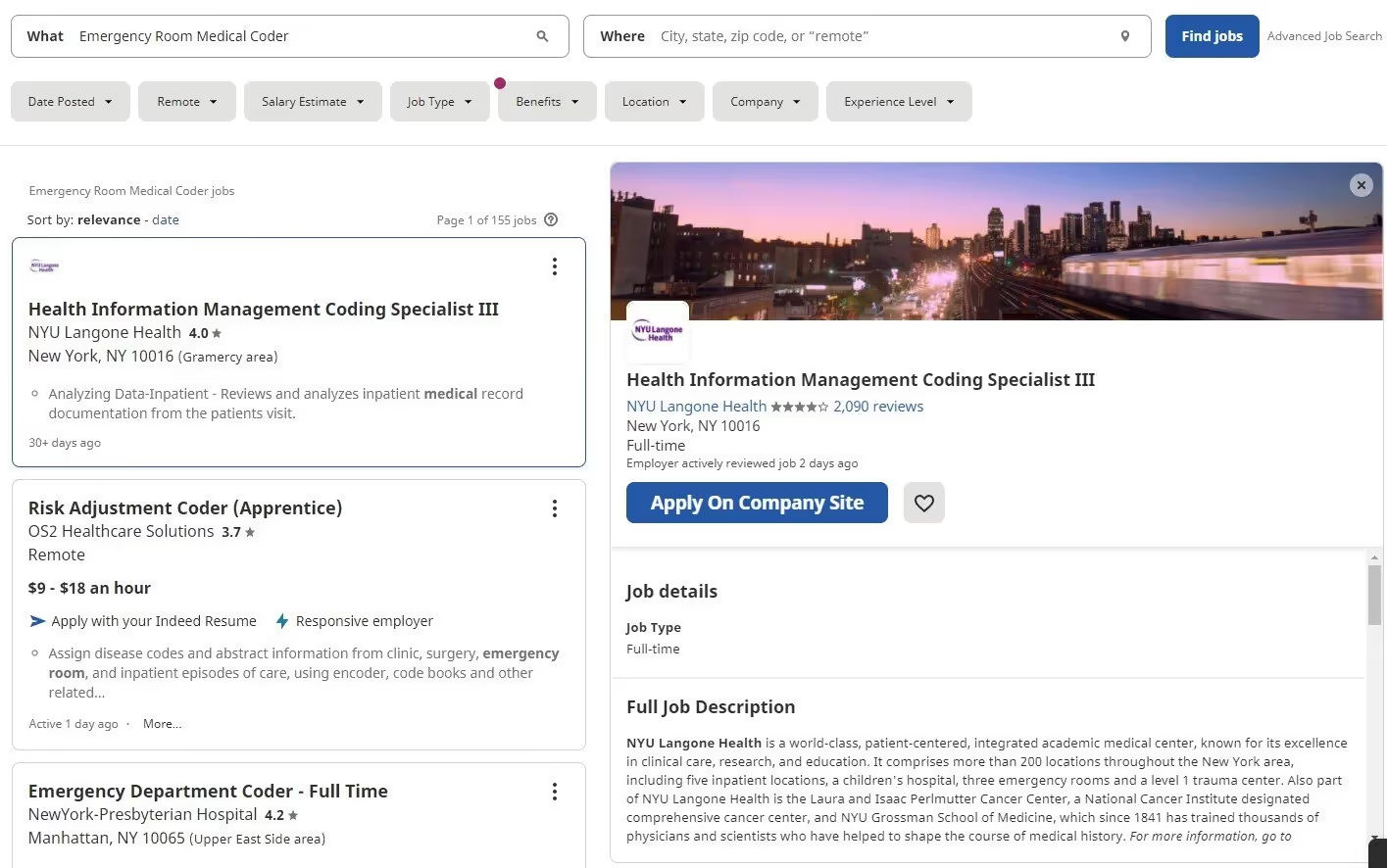
You need to be able to read and understand physician notes when dealing with the emergency department. Since you are also working with ED physicians, you need to know the codes related to surgical procedures. Laceration repair, fracture care, foreign body removal, and thoracenteses are procedures that you may need to know about.
To work in an emergency department, you should be familiar with a multitude of topics. This includes the coding of moderate sedation, time-based coding, denials, and much more.
Rules and regulations of Medicare billing are something you also need to know. This includes teaching situations, shared visits, consultations and global surgery depending on the organization.
Here is a list of the different certifications that organizations could accept when applying for such a position:
- Certified Emergency Department Coder (CEDC)
- Registered Health Information Technologist (RHIT)
- Registered Health Information Administrator (RHIA)
- Certified Coding Specialist-Physician (CCS)
- Certified Coding Specialist-Physician (CCS-P)
- Certified Professional Coder (CPC)
- Certified Outpatient Coder (COC)
Conclusion
As you can see, a medical coder with a certificate can get a variety of jobs. The industry is booming and will continue to grow. This list of 42 job titles is just the tip of the iceberg.
You can be a coder, a coordinator, an apprentice, an auditor, and more. You can work in the emergency department, a clinic, or even the radiology department.
Each position and each organization can require a multitude of different certifications. Some need professional coder certification. Other jobs might need more specialized certifications like the CANPC or the CEMC. All it takes is some studying and an exam.
Getting a certification in different areas of the medical coding world is one of the best ways to advance your career. It is also one of the easiest ways to increase your income.
Additional Coding Jobs That Require Certificates
- Billing Specialist - Physical Therapy
- Certified Professional Biller (CPB)
- Certified Coder
- Certified Professional Coder (CPC)
- Certified Coding Specialist (CCS)
- Registered Health Information Tech (RHIT)
- Registered Health Information Administrator (RHIA)
- Certified Coder - Home Health
- Certified Coding Specialist – Physician (CCS-P)
- Certified Coding Specialist (CCS)
- Certified Professional Coder (CPC)
- Registered Health Information Tech (RHIT)
- Certified Coder - Outpatient
- Registered Health Information Tech (RHIT)
- Registered Health Information Administrator (RHIA)
- Certified Coding Specialist (CCS)
- Certified Professional Coder (CPC)
- Certified Coding Associate (CCA)
- Certified Outpatient Coder (COC)
- Certified Inpatient Coder (CIC)
- Certified Professional Coder - Payer (CPC-P)
- CEMC
- CEDC
- Certified Coding Coordinator
- Certified Professional Coder (CPC)
- Certified Professional Coder- Hospital (CPC-H)
- Certified Coding Specialist (CCS)
- Certified Coding Specialist – Physician (CCS-P)
- ROCC
- Certified Medical Coder
- HCS-D
- Certified Medical Coders Outpatient & ED
- Registered Health Information Administrator (RHIA)
- Registered Health Information Tech (RHIT)
- Certified Medical Coder - Records
- Certified Coding Specialist (CCS)
- Certified Professional Coder (CPC)
- Certified Coding Specialist – Physician (CCS-P)
- Certified Inpatient Coder (CIC)
- Certified Outpatient Coder (COC)
- Certified Medical Coder - Urgent Care
- AHIMA
- or AAPC
- Certified Professional Biller
- Certified Professional Biller (CPB)
- Certified Professional Coder
- Certified Professional Coder (CPC)
- Coder - Benefits Configuration
- Certified Professional Coder (CPC)
- Coder - Clinic
- APC or AHIMA certifications are required
- Coder - ED
- Certification from AHIMA or AAPC
- Coder - E&M
- Certified Professional Coder (CPC)
- Certified Professional Coder Apprentice (CPC-A)
- Certified Professional Coder- Hospital (CPC-H)
- Registered Health Information Administrator (RHIA)
- Registered Health Information Tech (RHIT)
- Certified Coding Specialist (CCS)
- Certified Coding Associate (CCA)
- Certified Coding Specialist – Physician (CCS-P)
- Coder - Emergency Department
- Certified Professional Coder (CPC)
- Certified Coding Specialist (CCS)
- Certified Coding Specialist – Physician (CCS-P)
- Certified Coding Associate (CCA)
- Registered Health Information Administrator (RHIA)
- Registered Health Information Tech (RHIT)
- Coder - FSED & Urgent Care
- Certified Professional Coder (CPC)
- Certified Coding Specialist – Physician (CCS-P)
- Certified Outpatient Coder (COC)
- Coder - Hospital
- Certified Professional Coder (CPC)
- Certified Professional Coder- Hospital (CPC-H)
- Certified Coding Specialist (CCS)
- Certified Coding Specialist – Physician (CCS-P)
- Radiation Oncology Certification Coder (ROCC),
- Certified Interventional Radiology Coder (CIRCC),
- Registered Health Information Tech (RHIT)
- Registered Health Information Administrator (RHIA)
- Coder - Outpatient
- Certified Professional Coder (CPC)
- Certified Outpatient Coder (COC)
- Certified Coding Specialist (CCS)
- Certified Coding Associate (CCA)
- Registered Health Information Tech (RHIT)
- Registered Health Information Administrator (RHIA)
- Coder - Risk Adjustment
- Certified Professional Coder (CPC)
- Certified Risk Adjustment Coder (CRC)
- Coding Coordinator
- Certified Professional Coder (CPC)
- Coding Reviewer - OASIS and Diagnosis
- HCS-O
- COS-C
- Coding Specialist
- Certified Professional Coder (CPC),
- Certified Coding Specialist – Physician (CCS-P)
- Certified Professional Coder (CPC)
- Certified Coding Specialists (CCS)
- Coding Specialists - Medical Billing
- Certified Professional Biller (CPB)
- Certified Coding Associate (CCA)
- Certified Coding Specialist (CCS)
- Certified Professional Coder (CPC)
- Medical Bill Reviewer
- Certified Professional Coder (CPC)
- Medical Documentation Reviewer
- Certified Professional Coder (CPC)
- Certified Coding Specialist – Physician (CCS-P)
- Registered Health Information Tech (RHIT)
- Medical Coder
- Certified Professional Coder (CPC)
- Certified Inpatient Coder (CIC)
- Certified Outpatient Coder (COC)
- Certified Coding Specialist (CCS)
- Registered Health Information Technologist (RHIT)
- Registered Health Information Administrator (RHIA)
- Medical Coder - Anesthesia
- Medical Coding Certificate (CPC)
- Anesthesia and Pain Management Certificate (CANPC)
- Medical Coder - Clinic
- AAPC/AHIMA Coding Credential
- Medical Coder - Clinical Documentation Specialist (Mental Health)
- Medical Coding Certification or Clinical License
- Medical Coder - Emergency Department
- Certified Professional Coder (CPC)
- Certified Coding Specialist – Physician (CCS-P)
- Medical Coder - Emergency Facility
- AHIMA/AAPC coding credential
- Medical Coder- Inpatient
- Certified Coding Specialist (CCS)
- Certified Inpatient Coder (CIC),
- Registered Health Information Technician (RHIT)
- Registered Health Information Administrator (RHIA)
- Medical Coder - Pathology
- Certified Professional Coder (CPC)
- Medical Coder - Radiology
- Certified Professional Coder (CPC)
- Certified Coding Specialist (CCS)
- Certified Coding Specialist – Physician (CCS-P)
- SCC Coding Certification
- Medical Coder - Risk Adjustment
- Certified Risk Adjustment Coder (CRC)
- Certified Professional Coder (CPC)
- Certified Coding Specialist – Physician (CCS-P)
- Medical Coding Auditor
- Certified Coding Specialist – Physician (CCS-P)
- Certified Professional Coder (CPC)
- Registered Health Information Administrator (RHIA)
- Registered Health Information Tech (RHIT)
- CPMA
- Medical Coding Coordinator
- AAPC or AHIMA Coding Certification (no apprentice)
- Medical Coding Specialist
- Registered Health Information Administrator (RHIA)
- Registered Health Information Tech (RHIT)
- Certified Coding Specialist (CCS)
- Certified Coding Specialist – Physician (CCS-P)
- Medical Coding Apprentice Program
- Certified Professional Coder (CPC)
- Medical Biller
- Certified Ambulance Coder (CAC)
- or Certified Professional Coder (CPC)
- Medical Policy Coordinator
- Certified Professional Coder (CPC)
- Certified Coding Specialist (CCS)
- Professional Coder - Outpatient
- Registered Health Information Tech (RHIT)
- Certified Professional Coder (CPC)
- Certified Professional Coder Apprentice (CPC-A)
- Certified Coding Specialist (CCS)
- Certified Coding Associate (CCA)
Emphasize your product's unique features or benefits to differentiate it from competitors
In nec dictum adipiscing pharetra enim etiam scelerisque dolor purus ipsum egestas cursus vulputate arcu egestas ut eu sed mollis consectetur mattis pharetra curabitur et maecenas in mattis fames consectetur ipsum quis risus mauris aliquam ornare nisl purus at ipsum nulla accumsan consectetur vestibulum suspendisse aliquam condimentum scelerisque lacinia pellentesque vestibulum condimentum turpis ligula pharetra dictum sapien facilisis sapien at sagittis et cursus congue.
- Pharetra curabitur et maecenas in mattis fames consectetur ipsum quis risus.
- Justo urna nisi auctor consequat consectetur dolor lectus blandit.
- Eget egestas volutpat lacinia vestibulum vitae mattis hendrerit.
- Ornare elit odio tellus orci bibendum dictum id sem congue enim amet diam.
Incorporate statistics or specific numbers to highlight the effectiveness or popularity of your offering
Convallis pellentesque ullamcorper sapien sed tristique fermentum proin amet quam tincidunt feugiat vitae neque quisque odio ut pellentesque ac mauris eget lectus. Pretium arcu turpis lacus sapien sit at eu sapien duis magna nunc nibh nam non ut nibh ultrices ultrices elementum egestas enim nisl sed cursus pellentesque sit dignissim enim euismod sit et convallis sed pelis viverra quam at nisl sit pharetra enim nisl nec vestibulum posuere in volutpat sed blandit neque risus.

Use time-sensitive language to encourage immediate action, such as "Limited Time Offer
Feugiat vitae neque quisque odio ut pellentesque ac mauris eget lectus. Pretium arcu turpis lacus sapien sit at eu sapien duis magna nunc nibh nam non ut nibh ultrices ultrices elementum egestas enim nisl sed cursus pellentesque sit dignissim enim euismod sit et convallis sed pelis viverra quam at nisl sit pharetra enim nisl nec vestibulum posuere in volutpat sed blandit neque risus.
- Pharetra curabitur et maecenas in mattis fames consectetur ipsum quis risus.
- Justo urna nisi auctor consequat consectetur dolor lectus blandit.
- Eget egestas volutpat lacinia vestibulum vitae mattis hendrerit.
- Ornare elit odio tellus orci bibendum dictum id sem congue enim amet diam.
Address customer pain points directly by showing how your product solves their problems
Feugiat vitae neque quisque odio ut pellentesque ac mauris eget lectus. Pretium arcu turpis lacus sapien sit at eu sapien duis magna nunc nibh nam non ut nibh ultrices ultrices elementum egestas enim nisl sed cursus pellentesque sit dignissim enim euismod sit et convallis sed pelis viverra quam at nisl sit pharetra enim nisl nec vestibulum posuere in volutpat sed blandit neque risus.
Vel etiam vel amet aenean eget in habitasse nunc duis tellus sem turpis risus aliquam ac volutpat tellus eu faucibus ullamcorper.
Tailor titles to your ideal customer segment using phrases like "Designed for Busy Professionals
Sed pretium id nibh id sit felis vitae volutpat volutpat adipiscing at sodales neque lectus mi phasellus commodo at elit suspendisse ornare faucibus lectus purus viverra in nec aliquet commodo et sed sed nisi tempor mi pellentesque arcu viverra pretium duis enim vulputate dignissim etiam ultrices vitae neque urna proin nibh diam turpis augue lacus.




